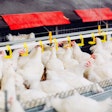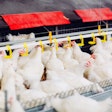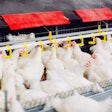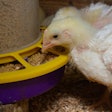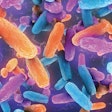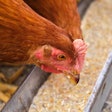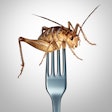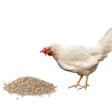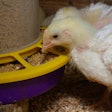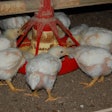
There is no universal definition of gut health, but now that we need to produce healthy chickens without antibiotic growth promoters, it is essential to discover what is beyond a simple microorganism.
At the European Simposium on Poultry Nutrition (ESPN 2019) held in Gdansk, Poland, the issue of gut health was broken down from several perspectives that can illuminate the path of the poultry industry, with different points of view and with the idea of improving poultry production efficiency with better feed conversion.
Holobiontic method
Marc-André Selosse, from the Natural History Museum of France, spoke about the importance of microorganisms. "Without microbes, there is no adequate digestion," he said. He also explained how certain processes of poisoning by external compounds ─ such as melamine contamination ─ are due more to microbial activity, that is, to the interaction of the compounds with the microbiota.
Domesticated animals develop with a microbiota that does not defend them well, it has been observed, said Selosse. Although he spoke about studies with mice, he opened the door to poultry. In addition, microbiota sends signals for neurological development in such a way that even behavior is affected.
"An animal is not an animal without microorganisms," Selosse said. Animals create networks with many microorganisms to exchange nutrients or information signals. In addition, there is an exchange among various microorganisms. Selosse questioned whether the bacteria exchange between animals could affect the development of one and the other.
“It may seem like science fiction, but I leave a whole set of possibilities open for all,” he concluded.
Microbiota modulation
Following the line of Selosse, Fanny Calenge, a researcher at the French National Institute for Agricultural Research (INRA), said that human beings are not alone, because they live with billions of microorganisms that live in their bodies.
In birds, the acquisition of microorganisms begins at hatching. Calenge highlighted that these microorganisms perform many functions, such as immunity, an effect of barrier against pathogens, participation in metabolism, and influence on behavior.
At the INRA, they study the modulation of avian microbiota for several reasons. First, because of the great economic importance of the poultry industry. Second, because of the presence of many intestinal pathogens, including some zoonotic pathogens. In addition, birds can be a reservoir of genes for resistance to antibiotics, and their microbiota is different from that of mammals. All this has an impact both on animal productivity and on human and animal health.
Dr. Calenge emphasized the need to have efficient tools to characterize poultry microbiota, so she explained two methods: the objective sequencing of a variable gene segment and the sequencing of the complete metagenome. At INRA, they already have a very wide reference metagenome of chicken cecal microbiota.
Microbiome interactions
The importance of microbiome is not only for the intestine but of other body systems. Michael Kogut, a researcher at the U.S. Agriculture Department (USDA), said intestinal health is the greatest interface between the external environment and the host's internal milieu.
The intestine is also the largest barrier of absorption and excretion of molecules, the largest place of residence of immune cells, and the natural habitat of a huge and varied community of microorganisms. If this community is affected, the whole organism is affected.
Dr. Kogut also pointed out that “microbiota plays a basic role in the induction, education, and function of the immune system.” In addition, immune cells depend on microbial metabolites for their development, behavior, and function.
However, the immune system goes beyond protection because it also regulates the physiology of other organs. He also noted that there is a bidirectional communication axis between the brain and the intestine, and also another with the lungs.
In this way, the question arises that if we can manipulate the intestine for its own benefit, it could also be for the behavior and improvement of the feed conversion. “This is not science fiction. In the future, we will work on this.”
Finally, he said that sometimes we dedicate a lot of time to a single microorganism, so “we need to identify the whole community, which is what matters. We need to know how they work and work together.”









